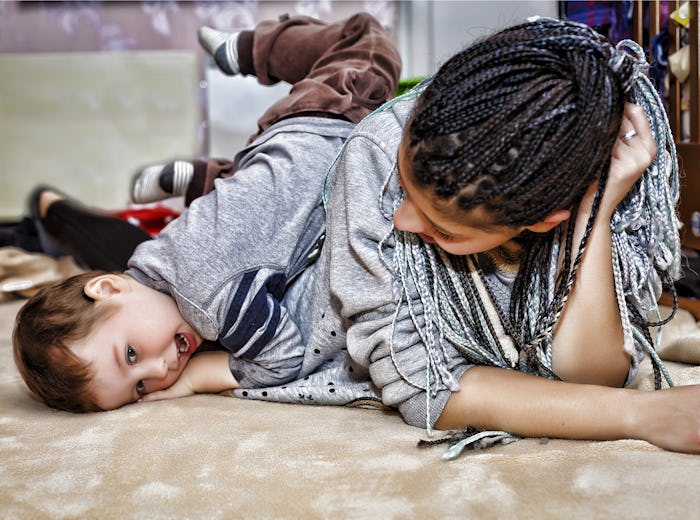Life

6 Things Moms Raising Compassionate Sons Never Do
My son is the sweetest kid I know (don't tell my daughter I said that). He is kind, compassionate, and constantly happy. Last week, while he and his sister were playing on the living room rug, he threw a toy and accidentally hit her in the face. She started to cry. At first, he sat in what looked like slight terror, but then quickly walked over to her, hugged her, and said he was sorry. No one prompted him, either. He did so all on his own. He displayed compassion, and while raising compassionate sons isn't very difficult, there are definitely thing parents do that can hinder the process.
I can tell my son is very in-tune with his emotions. He is constantly observing people's reactions, and he is very affectionate. He randomly tells his fathers and I that he loves us, all day, every day. He comforts his friends and his sister when they are upset, and he reminds us that the cat is hungry when she starts to meow. He is sensitive and empathetic and caring. I do believe that in so many ways he was born this way, and both of his parents and their families are empathetic people. But compassion and empathy aren't just innate; they require fostering and promotion.
My husband and I went into this parenting thing without any experience, obviously. We weren't given a manual, and still, to this day, we are mostly just winging it and using common sense and logic to the best of our ability. The one thing we learned early on, however, is that children need parents who will listen to them and who will validate their feelings. We do our best, every day, to show and model empathy and compassion. So, if you want to raise compassionate boys, here are some things you may want to avoid:
Perpetuate Toxic Masculinity
Toxic masculinity suppresses boys' and men's emotional range in order to make them succumb to society's idea of how a male should behave and act. Sometimes, parents unknowingly perpetuate toxic masculinity by telling their sons to "toughen up" and to "suck it up" and to "be a man." Forcing a child to suppress his emotions ,all of the sake of some made-up set of standards, does not teach your child to be compassionate. In fact, lack of compassion is a direct result of toxic masculinity.
Compare Them To Other Boys
Comparing children to one another is probably never the best choice, but let's be honest, many of us do it from time to time. This is something parents definitely need to be cognizant of, because comparing only belittles the feelings of your child. Comparing your children to the accomplishments of others lowers their self-esteem, and their ability to feel compassion for others, as well.
Model Disrespect
Part of being a compassionate individual is respecting the opinions, thoughts, bodies, and emotions of others. If parents disrespect each other or others in front of their children, how can they expect their children to behave otherwise? In order to raise compassionate children, parents should be able to always model respect, and never be disrespectful towards others.
Be Emotionally Unavailable
I know we all lead busy lives, and sometimes we get so caught up with the everyday chaos, we forget to be there for our children when they need us most. We may not even know our children need us when we're trying to make it through the day. However, being emotionally unavailable does not foster any compassion in children, it makes them hard insider and internalize their hurt feelings.
Dismiss Their Feelings
Feelings are important and pushing them aside can be emotionally draining and unhealthy. Sometimes, our first instinct, as parents, when our kid is upset is to tell them that all will be OK. But the truth is, some things are not at all OK and dismissing their feelings can hurt more than help.
Furthermore, nurturing children's feelings make them realize that feelings are, in fact, important, and that leads to feeling compassion towards others.
Implement Harsh Discipline
Once again, it's sometimes difficult to stop and breathe when you're exhausted from a full day of work. And it's often easier and less work to just yell at your kid if he accidentally spills an entire gallon on milk on your freshly cleaned floors. But sometimes parents should take a step back before reacting. Accidents happen and punishments shouldn't be harsher than the crime. Sometimes, the best thing a parent can do when their child makes a mistake is to say, "That's OK, everyone makes mistakes." See? Compassion.